
The leader of the Lebanese Forces (FL), Samir Geagea. (Credit: Archive photo from 2022. Joseph Eid/AFP)
The leader of the Lebanese Forces (LF), Samir Geagea, has contended that Damascus' recent opposition to surveillance towers installed by the British in 2014 on the border between Lebanon and Syria is motivated by the Bashar al-Assad regime's concern about the sustainability of its alleged drug trafficking operations.
"The Syrian objection to the towers erected by Lebanon on its territory is linked to the Damascus regime's ability to monitor drug smuggling, which has become the biggest trafficker in the region," Geagea said in a statement relayed Sunday by the Lebanese state-run National News Agency (NNA).
"If the Syrian government's request reveals anything, it is the intentions of its leaders. Despite everything that has happened in Syria, its regime still displays a hostile and negative attitude towards Lebanon," Geagea added.
He continued, "It is important that the Lebanese, all the Lebanese, realize this, and that those who are still conspiring with the Syrian regime stop doing so with a defunct regime against the interests of their country." Lebanese parties such as the pro-Iranian Hezbollah, the Syrian National Social Party (SNSP) and the Marada Movement all advocate closer ties with Damascus.
The subject raised by Geagea dates back to last month. In a letter of protest dated Feb. 18 February and sent to Lebanon, the Syrian Foreign Ministry protested, 10 years after the fact, against the erection of around 40 watchtowers, which had been installed on Lebanese territory. Financed at the time by the British government, which also trained Lebanese soldiers to take up positions in the towers, the towers adjacent to Lebanese Army posts enabled the army to better control a porous border 370km long. At the time, Lebanon was in the midst of a war against Islamic State fighters, who were infiltrating the country in large numbers, while the civil conflict in Syria was still in its early stages.
Following receipt of the Syrian letter of protest, the Lebanese Foreign Minister Abdallah Bou Habib, indicated that Damascus "probably feared that the information gathered by the army on their border would be passed on to a third party." He also suggested that this "could be explained by London's recent proposal to install the same equipment in south Lebanon."
According to the head of the LF, Damascus is above all afraid of seeing the various trafficking routes that cross the border between Lebanon and Syria compromised.
"In recent weeks, the Syrian government has sent a letter of protest to Lebanon about the towers erected on its territory to control its borders and stop the trafficking of drugs, arms, goods and contraband, with the aim of saying that these towers threaten its national security," Geagea explained.
"The first thing that attracts attention and surprises is the fact that the Syrian government is talking about Syrian national security, which today is non-existent, given the presence on its soil of Iranian militias and the Russian, Turkish and American armies, among others," he continued, before asking, "So what national security is this government talking about?"
The head of the LF added, "All the border towers to which the Syrian government objects are located on Lebanese territory, and Lebanon certainly has the right to establish them to monitor and control smuggling" and the movement of people. Finally, he went on to highlight "the daily clashes on the Syrian-Jordanian border," which are "the clearest proof" that Syria is "the biggest drug trafficker in the region and even in the world." The Jordanian authorities regularly announce operations targeting drug traffickers in this area.